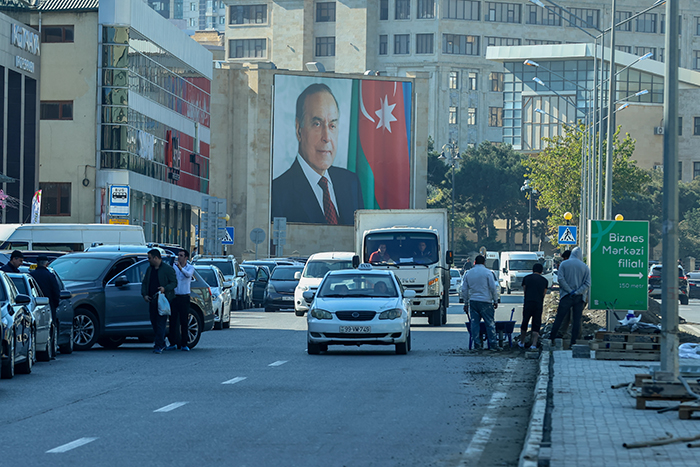Analyses / Climate, Environment, Security
29 November 2024
The Cop 29 in Azerbaijan: The Fossil Fuels Deliberately Forgotten

The 2024 Baku Conference on Climate Change, or COP 29, is the 29th Conference of the Parties (COP) on Climate, organized by the United Nations. It took place from November 11 to 22, 2024, and brought together over 200 countries. What were the energy-related outcomes? Analysis by Sami Ramdani, researcher at IRIS on energy issues.
Portrait of the Host Country: Hydrocarbons at the Heart of the Azerbaijani Economy
Azerbaijan is a country with limited climate ambitions. In the update of its Nationally Determined Contribution (NDC) in 2023, Azerbaijan set a target of reducing emissions by only 40% by 2050, contingent upon receiving international support. In comparison, other post-Soviet hydrocarbon-rich countries like Kazakhstan, Uzbekistan, and Russia have adopted net-zero goals by 2050.
The energy sector generates 75% of Azerbaijan’s greenhouse gas emissions. Oil and gas account for 45% of the country’s GDP, more than half of its state tax revenues, and at least 85% of its export revenues. Far from planning a phase-out of fossil fuels, Azerbaijan is trying to slow the decline of its oil production. By 2033, the country even plans to increase its gas production by a third, reaching 49 billion m³ (up from 37 billion m³ in 2024). Thanks to rising gas prices, Azerbaijan’s export revenues increased from $5.56 billion in 2021 to $14.99 billion in 2022, and $13.68 billion in 2023, surpassing the country’s oil export revenues for the first time in its history.
In 2022, natural gas accounted for 93% of Azerbaijan’s total electricity production, while renewable energies made up only 6% (with these 6% almost entirely consisting of hydropower). Azerbaijan, which was slow to develop solar and wind energy, is now working on ambitious projects in these sectors, particularly in partnership with Emirati and Saudi companies. However, the increase in renewable energy production capacity for the local market seems, for the moment, to be aimed primarily at freeing up more gas volumes for export to the lucrative European market.
Azerbaijan, a Geopolitical Player That Holds Weight Through Hydrocarbon Exports.
Azerbaijan is a small hydrocarbon producer on a global scale. Even within Europe, Azerbaijan, being the fourth largest supplier of gas to the EU via pipeline after Norway, Algeria, and Russia, accounts for only about 3% of the EU’s total gas imports. However, while these percentages do not represent a huge share of the European market, they carry significant geopolitical weight. Indeed, the country has become a crucial source for supplying the region with energy security, particularly in Central and Eastern Europe, which has historically been dependent on Russian gas. Reflecting this dynamic, on July 18, 2022, the EU and Azerbaijan signed a memorandum of understanding for a strategic energy partnership. The memorandum aims to double the capacity of the Southern Gas Corridor to reach at least 20 billion cubic meters per year by 2027.
When reaffirming this goal in March 2024, European Commissioner for Energy Kadri Simson stated: “In the face of increasing Russian violence and the ongoing unjustified war at our doorstep, it is increasingly clear that, for Europe, there will be no return to normal energy relations with Russia. This space is now occupied by other reliable and trusted energy partners. And this is exactly what we have found in Azerbaijan.” This statement is particularly ironic considering the two military offensives by Azerbaijan against Armenian forces in Nagorno-Karabakh in 2020 and 2023 and the allegations of ethnic cleansing related to the country’s recapture of the region.
Cynically, a special place has been reserved in Azerbaijan’s energy transition plans for the territories reclaimed from Armenian control. In its updated Nationally Determined Contribution, Azerbaijan announced its intention to make the territories now classified as the Karabakh and Eastern Zangezur economic regions a “net-zero emissions zone” by 2050, as part of the reconstruction effort. Hydropower is expected to play a key role, but solar and wind power plants are also planned. One such project embodies the intersection of Western business interests and Azerbaijan. BP, a gas and oil producer in the Caspian Sea, is set to build a 240 MW solar plant in the Jabrayil district (Eastern Zangezur), with the electricity generated to decarbonize operations at the Sangachal oil terminal, which currently runs on gas-produced electricity. Thus, a territory at the heart of the conflict between Azerbaijan and Armenia will be used to “green” oil production and, in the process, contribute to the goal of freeing up more gas for exports to Europe.
Assessment of COP 29 Regarding Fossil Fuels
In any case, by March 2024, Kadri Simson was confident that President Aliyev and his team would lead us to a positive outcome at COP 29. So, what were the results on the energy front? The main outcome of COP 28 in Dubai regarding fossil fuels, the call for a “transition” away from fossil energy, is not explicitly mentioned in the main final texts presented in Baku. However, one of the documents published by the Azerbaijani presidency just before the final plenary reaffirms that “transitional fuels can play a role in facilitating the energy transition while ensuring energy security.” This is a direct reference to natural gas, whose importance we have seen for the host country.
According to Elnur Soltanov, Azerbaijan’s deputy minister of energy, who led COP 29, the Paris Agreement — under which countries agreed to limit global warming to below 2°C and ideally to 1.5°C — does not necessarily mean a reduction in fossil fuel production. This vision involves widespread use of carbon capture. This reflects a continuation of the techno-solutionist approach that characterized COP 28 in Dubai, an approach that could be seen as a form of escapism.
Europeans had hoped for the creation of an annual monitoring mechanism for efforts to transition away from fossil fuels. They did not get it. The UN Climate Arab Group is likely to be more satisfied, as it argued through the Saudi representative, Albara Tawfiq, that it “will not accept any text that targets specific sectors, including fossil fuels.” However, there is a modest initiative from the host country regarding fossil sectors. The Azerbaijani government announced the establishment of a Climate Finance Action Fund. This investment fund is to receive financial contributions from fossil fuel-producing countries and companies, with the goal of investing in projects that reduce greenhouse gas emissions and strengthen resilience to the effects of climate change in developing countries. However, contributions to the fund will be voluntary. Azerbaijan aims to secure at least $1 billion from at least 10 contributors to capitalize the fund. Its board of directors will be composed of representatives from the contributors. The creation of this fund represents a first, tentative attempt in the context of UN climate negotiations to make fossil fuel producers responsible for helping poor countries pay for the consequences of climate change that they are suffering. We are still far from a tax on fossil fuels, which some actors are calling for.
COP 29 opened with a speech by Azerbaijani President Ilham Aliyev, calling fossil fuels a “gift from God.” It might be beneficial for him to reread verse 216 of Surah Al-Baqarah, which says, “Perhaps you hate something, although it is good for you. And perhaps you love something, although it is bad for you. Allah knows, while you do not know,” as the backlash for Azerbaijan could be severe. Beyond the negative climate impact that concerns everyone, the expansion of the country’s gas production capacities also entails a significant risk of stranded assets. Indeed, the viability of these projects depends on European demand, which is uncertain. Natural gas demand in the EU has been declining since 2022, due to a combination of lower industrial consumption, efficiency gains, and the accelerated deployment of renewable energies. European climate goals indicate that this decline is likely to continue.
Furthermore, EU law stipulates that new fossil fuel supply contracts cannot extend beyond 2049. This makes it impossible for European companies to enter into long-term gas supply agreements with Azerbaijan. Without long-term commitments, it will be difficult to finance the expansion of the Southern Gas Corridor necessary to transport additional volumes. Especially since Europeans may be reluctant to develop these pipelines, which are rigid structures that do not offer the supply flexibility provided by liquefied natural gas (LNG) transport by tankers. LNG maritime transport is even more in line with Europeans’ interests from an energy transition perspective, as the EU’s new LNG import terminals are typically floating units, allowing them to be a temporary solution, while a pipeline is meant to last.
Although fossil fuels were deliberately omitted from the final texts presented in Baku, with the Azerbaijani presidency showing leniency towards the positions of the Arab countries, Laurence Tubiana, director of the European Climate Foundation, believes that “the discussion is not closed,” but only “postponed.” The text mentioning a “transition” away from fossil fuels, which was not adopted at this COP, should be discussed again at the technical pre-COP negotiations in Bonn in June 2025.

